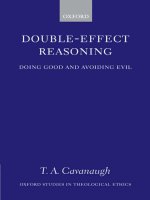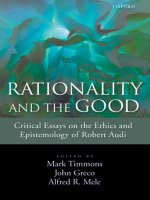- Trang chủ >>
- Khoa Học Tự Nhiên >>
- Vật lý
reasons and the good oct 2006
Bạn đang xem bản rút gọn của tài liệu. Xem và tải ngay bản đầy đủ của tài liệu tại đây (2.1 MB, 189 trang )
REASONS AND THE GOOD
This page intentionally left blank
Reasons
and the Good
ROGER CRISP
CLARENDON PRESS · OXFORD
1
Great Clarendon Street, Oxford
Oxford University Press is a department of the University of Oxford.
It furthers the University’s objective of excellence in research, scholarship,
and education by publishing worldwide in
Oxford New York
Auckland Cape Town Dar es Salaam Hong Kong Karachi
Kuala Lumpur Madrid Melbourne Mexico City Nairobi
New Delhi Shanghai Taipei Toronto
With offices in
Argentina Austria Brazil Chile Czech Republic France Greece
Guatemala Hungary Italy Japan Poland Portugal Singapore
South Korea Switzerland Thailand Turkey Ukraine Vietnam
Oxford is a registered trade mark of Oxford University Press
in the UK and in certain other countries
Published in the United States
by Oxford University Press Inc., New York
Roger Crisp 2006
The moral rights of the author have been asserted
Database right Oxford University Press (maker)
First published 2006
All rights reserved. No part of this publication may be reproduced,
stored in a retrieval system, or transmitted, in any form or by any means,
without the prior permission in writing of Oxford University Press,
or as expressly permitted by law, or under terms agreed with the appropriate
reprographics rights organization. Enquiries concerning reproduction
outside the scope of the above should be sent to the Rights Department,
Oxford University Press, at the address above
You must not circulate this book in any other binding or cover
and you must impose this same condition on any acquirer
British Library Cataloguing in Publication Data
Data available
Library of Congress Cataloging in Publication Data
Crisp, Roger, 1961–
Reasons and the good / Roger Crisp.
p. cm.
Includes bibliographical references and index.
ISBN-13: 978–0–19–929033–8 (alk. paper)
ISBN-10: 0–19–929033–4 (alk. paper)
1. Ethics. 2. Practical reason. I. Title.
BJ1012.C75 2006
170
.42—dc22 2006016460
Typeset by Laserwords Private Limited, Chennai, India
Printed in Great Britain
on acid-free paper by
Biddles Ltd., King’s Lynn, Norfolk
ISBN 0–19–929033–4 978–0–19–929033–8
13579108642
For Catherine
This page intentionally left blank
Acknowledgements
During the writing of this book many people have assisted me with
insightful comments, discussion, and advice. Some of these people, to
whom I am especially grateful, have read and commented on complete
or nearly complete drafts: Robert Audi, Jonathan Dancy, Stephen
Gardiner, Brad Hooker, Matthew Liao, Andrew Mason, Derek Parfit,
Michael Ridge, John Skorupski, Larry Temkin, Jeremy Watkins, and
David Wiggins.
Alan Thomas invited me to present drafts of chapters at a series of
research seminars at the University of Kent, Canterbury, and I wish to
express thanks to him and to participants in these seminars, especially
Jonathan Friday, Edward Harcourt, Simon Kirchin, Richard Norman,
Sean Sayers, Tony Skillen, Murray Smith, Julia Tanney, and Robin
Taylor. John Tasioulas organized at Corpus Christi College, Oxford, a
colloquium on a draft of the book under the auspices of the Oxford
Centre for Ethics and the Philosophy of Law. I am indebted to him,
to Robert Audi, Krister Byvkist, Jonathan Dancy, Joseph Raz, and
Susan Wolf, who provided commentary on individual chapters, and
to other participants: James Griffin, Brad Hooker, Douglas Maclean,
Jonas Olson, and Onora O’Neill.
Others who have helped me, often substantially, include Robert
M. Adams, Gustaf Arrhenius, Elizabeth Ashford, Lawrence BonJour,
Nigel Bowles, John Broome, Benoît Casteln
´
erac, Paul Coates, Michael
DePaul, Timothy Endicott, Joshua Gert, Bernward Gesang, John Greco,
Lorenzo Greco, Bashshar Haydar, Nils Holtug, Desmond King, James
Levine, Kasper Lippert-Rasmussen, Noboru Maruyama, Adrian Moore,
Andrew Moore, Kevin Mulligan, Stuart Opotowsky, Michael Otsuka,
Catherine Paxton, Ingmar Persson, Thomas Petersen, Vasilis Politis,
Robert Pulvertaft, Andrew Reisner, Daniel Robinson, Guy Robinson,
Paul Robinson, Mark Rowlands, Jesper Ryberg, Julian Savulescu, Tim
Scanlon, Bart Schultz, Robert Shaver, Daniel Star, Philip Stratton-Lake,
Gabriele Taylor, Valerie Tiberius, Mark Timmons, Pete Tramel, Adrian
Viens, Robert Wardy, Ralph Wedgwood, Andrew Williams, Nick Zang-
will, and Michael Zimmerman. There are no doubt others I should have
mentioned, and to them I apologize for my poor memory. I wish to thank
audiences at the following: the Reading Philosophy Graduate Seminar;
viii Acknowledgements
a workshop at the Dept. of Philosophy, University of Copenhagen; the
Oxford Jurisprudence Discussion Group; the Trinity College Dublin
Philosophy Colloquium; the University of Hertfordshire Philosophy
Research Symposium; the University of Northampton Philosophy Soci-
ety; the University of Bristol Philosophy Research Seminar; and the
University of Stockholm Philosophy Colloquium.
Without the support of a Leverhulme Trust Major Research Fel-
lowship between 2003 and 2005 I would have been unable to write
this book or indeed any book. I am greatly indebted to the Trust-
ees. For allowing me to take the necessary leave, I am grateful to the
Principal and Fellows of St Anne’s College, and to the Board of the
Faculty of Philosophy at the University of Oxford. Peter Momtchiloff
at Oxford University Press has combined his characteristic patience and
wisdom with appropriate degrees of exhortation and encouragement. I
am grateful also to Jacqueline Baker and Rupert Cousens at OUP, and
consider myself lucky to have had Laurien Berkeley as my copy-editor.
My continuing connection with the Uehiro Foundation on Ethics and
Education has remained a source of pride and pleasure.
Some of the book is based on earlier articles of mine. I thank the Royal
Institute of Philosophy, Oxford University Press, the International
Phenomenological Society, Chicago University Press, and editors of
Philosophy, The Stanford Encyclopedia of Philosophy, Philosophy and
Phenomenological Research,andEthics for permission to use material from
the following, details of which will be found in the Bibliography: ‘Does
Modern Moral Philosophy Rest on a Mistake?; ‘Well-being’; ‘Hedonism
Reconsidered’; ‘Sidgwick and the Boundaries of Intuitionism’; ‘Equality,
Priority, and Compassion’ ( 2003 by the University of Chicago. All
rights reserved). Material from ‘The Dualism of Practical Reason’ is
used by courtesy of the Editor of the Aristotelian Society: 1996. I
wish to reiterate here the thanks recorded in the original versions of
these articles.
R.S.C
Oxford
April 2006
Contents
Introduction 1
1. Morality 5
1. Questions and Concepts 5
2. Morality and Law 9
3. Avoiding the Moral Concepts 20
4. Anscombe and the Myth of Obligation 27
2. Reasons 36
1. Normative Reasons 36
2. Realism about Normative Reasons 45
3. Oughts and Normative Requirements 56
4. Reasons and Values 61
5. Well-Being: Moore and Scanlon 67
3. Knowledge 71
1. Intuitionism and Self-Interest 71
2. Acquisition and Application: Particular Cases 80
3. The Mathematical Analogy 82
4. Certainty, Disagreement, and Dogmatism 88
4. Well-Being 98
1. Hedonism’s Decline 98
2. Hedonism 100
3. Enjoyment 103
4. The Philosophy of Swine? 111
5. The Experience Machine and the Value of
Accomplishment 117
5. Practical Reason 126
1. Temporal Neutrality and the Self 126
x Contents
2. The Dualism of Practical Reason 131
3. Weighing Well-Being 139
6. Equality 146
1. Equality 146
2. Priority 152
3. Sufficiency 158
4. Conclusion 162
Bibliography 163
Index 175
Introduction
If there is such a thing as the truth about the subject matter of
ethics—the truth, we might say, about the ethical—why is there
any expectation that it should be simple? In particular, why should
it be conceptually simple, using only one or two ethical concepts,
such as duty or good state of affairs, rather than many? Perhaps we
need as many concepts to describe it as we find we need, and no
fewer.
(Bernard Williams, Ethics and the Limits of Philosophy)
Williams is right. And it is in some ways regrettable that reflection
on ethical concepts is now significantly less common than it was in
the days of ‘linguistic philosophy’. Many ethical concepts have quite
particular evolutionary, social, and cultural histories which it must
surely be a mistake to ignore if one is at all inclined to follow through
an implication of one interpretation of Williams’s suggestion—that
we should avoid using concepts for which we have no need. In this
book I begin by trying to see the wood for the trees in ethics, and the
wood I describe is—as a reader for the Press put it—‘a stark shape of
close-packed conifers in an empty landscape’. I know that few readers
will share my perspective. But I stand by Williams’s principles, and ask
these readers to describe to me what it is in the ethical landscape that I
am missing.
The book opens with the suggestion that a—perhaps the—fun-
damental question in philosophical normative ethics concerns what
each of us has reason to do. That leads one immediately into the issue of
whether we have moral reasons to act, in the sense of ultimate or non-
derivative reasons the correct description of which makes ineliminable
use of the moral concepts—right, wrong, good, bad, virtuous, kind,
cruel, and so on. Drawing an analogy between morality and law as social
2 Introduction
phenomena, I claim that there is a strong case for thinking that morality
in itself provides no such reasons, though there may well be derivative
reasons for doing what some actual morality or other prescribes. If I
am right, then the correct theory of reasons for action should be stated
without using the moral concepts.
In the hope of offering such a theory, in the second chapter I discuss
the notion of a reason for action. I begin by distinguishing epistemic
from practical reasons, and suggest that all practical reasons must be
grounded in well-being. I go on to distinguish, within the domain of
practical reasons, between explanatory (including motivating) reasons,
and normative reasons. Normative reasons I define as properties of
actions that count, for the agent in question, in favour of the performance
of those actions by that agent. I then categorize normative reasons as
either grounding or justificatory, the former being those of primary
interest in ethics. My view of reasons is that they are, to use Williams’s
term, ‘external’ and I spend some time in defending the external view
against his objections, and then realism about reasons against Humean
and Kantian critiques. The chapter concludes with discussions of the
relation between reasons and values and a defence against the arguments
of G. E. Moore and T. M. Scanlon that the concept of well-being
cannot be central to ethics.
An obvious question to ask of anyone who claims that we have some
reason or other to act is how we are supposed to know what they
are. In Chapter 3 I defend ethical intuitionism as the most plausible
account of our knowledge of certain basic normative principles. The
example I take is the principle that each of us has a reason to promote
our own well-being, the strength of which reason is in direct proportion
to the degree of promotion. The intuitionism I advocate is relatively
modest, the essential components of the idea being that human beings
have a capacity for grasping certain a priori truths, that such truths
include truths about normative reasons, and that a grasp of such a
truth can in itself provide justification for accepting it, in some cases
sufficient justification for knowledge. After some discussion of issues
concerning universality I defend the analogy between ethical principles
and mathematics which has been standard in the rational intuitionist
tradition. Intuitionists are often thought to be dogmatists. But I make
no claims to infallibility and indeed in the final section of the chapter
argue that the degree of disagreement in ethics shows that we know very
Introduction 3
little and should therefore adopt what amounts to a modest Pyrrhonist
attitude in philosophical debate.
Well-being has already played an important role in my claims about
the grounding of reasons and about value and self-interest. In the fourth
chapter I approach the question of the best account of well-being,
making a case for a historically significant but, in philosophy at least,
currently unpopular view: hedonism. Having clarified the scope of the
theory I wish to defend, I argue for another traditionally popular but
now largely rejected view—that enjoyment is a felt quality common to
every enjoyable experience. The chapter concludes with a development
of Mill’s distinction between the quality and quantity of pleasures,
intended as a way of avoiding the objection that hedonists reduce all
enjoyment to a ‘common denominator’, and some responses to the
argument that hedonism must be rejected on the ground that it requires
us to plug into an ‘experience machine’.
So far in the book I have expressed support for the claim that each
of us has a reason to promote her own well-being. If that were the only
reason we had, then egoism would be true. In Chapter 5 I begin by
discussing the nature of self-interested reasons themselves, agreeing with
Derek Parfit that what matters is not personal identity. Rather, I suggest,
what matters to each of us is the hedonic quality of the experiences
realized by the exercise of any capacity for conscious experience we now
have or any such capacity in future which emerges from our present
capacity (thus allowing for division of capacities, between which other
things being equal we should be impartial). But is an egoism based on
this view correct? In the rest of the chapter I argue that the well-being
of others can ground reasons for each of us to act, sometimes to the
detriment of our own individual well-being. The well-being of others is
to be assessed impartially in the sense that no intrinsic weight is to be
attached to relationships with others, so that my view may accurately
be described as a version of the ‘dualism of practical reason’. Reasons
are either self-interested or impartial and must be weighed against one
another in particular cases. How strong a reason might we have to
sacrifice ourselves for the sake of the good of others? I argue that there
is a threshold beyond which reason cannot require any further sacrifice.
The notion of a threshold reappears in the final chapter. Given my
rejection of special relations as grounds for reasons, it might seem likely
that I shall claim that the impartial principle to counter self-interest is
4 Introduction
act-utilitarianism. But act-utilitarianism ignores the idea that dis-
tribution of goods can matter independently of pure aggregation.
I reject two theories of such distribution—egalitarianism and the
‘priority view’—before arguing for the view that there is a certain
threshold—that at which an individual has ‘enough’—such that the
well-being of those below that threshold grounds reasons of a strength
that varies in proportion to the distance from the threshold.
1
Morality
1. QUESTIONS AND CONCEPTS
Philosophy books usually seek to answer several questions, of which
some are more fundamental than others. A book on knowledge, for
example, might contain a chapter about the kind of justification required
for a true belief to count as knowledge. But an earlier chapter might
well have answered the prior question whether knowledge should be
understood as justified true belief in the first place. And earlier still there
may have been some discussion about whether we need the concept of
knowledge in epistemology at all.
This is a book of moral philosophy. A fundamental concern of moral
philosophy, it might be assumed, is what one ought, morally, to do.
There is significant disagreement about that in certain cases, so it might
seem at first sight that a fundamental question in moral philosophy
must be which of the many different moral views available is correct.
Indeed some philosophers seem to have thought like this. In the first
paragraph of his Foundations of Ethics, for example, Sir David Ross says:
I propose to take as my starting-point the existence of what is commonly called
the moral consciousness; and by this I mean the existence of a large body of
beliefs and convictions to the effect that there are certain kinds of acts that
ought to be done and certain kinds of things that ought to be brought into
existence.
¹
Ross goes on to outline his favoured ‘method of ethics’, which he claims
to be endorsed by Socrates, Plato, Aristotle, and Kant. It consists in
examining these moral beliefs, comparing them with one another, and
clearing up any ambiguity. Those that remain we may assume to be
justified.
¹ Ross, Foundations of Ethics,1.
6 Morality
It may be that Ross’s use of the term ‘method’ here is intended to
imply a contrast with the view of Henry Sidgwick, in whose Methods of
Ethics we read:
we conceive it as the aim of a philosopher, as such, to do somewhat more than
define and formulate the common moral opinions of mankind. His function is
to tell men what they ought to think, rather that what they do think though
he is expected to establish and concatenate at least the main part of the
commonly accepted moral rules, he is not necessarily bound to take them as the
basis on which his own system is constructed. Rather, we should expect that the
history of Moral Philosophy would be a history of attempts to enunciate, in
full breadth and clearness, those primary intuitions of Reason, by the scientific
application of which the common moral thought of mankind may be at once
systematised and corrected.
²
The contrast, then, might seem to be between those, such as Ross, who
begin with unreflective common-sense morality and end with reflective,
and those, such as Sidgwick, who claim to base their views on rational
intuitions which are themselves independent of common-sense morality.
Any difference here, however, is if anything one of subtle degree rather
than of kind. Ross approvingly quotes Aristotle’s famous statement of
his ‘dialectical’ method of ethics:
As in our other discussions, we must first set out the way things appear to
people, and then, having gone through the puzzles, proceed to prove the
received opinions about these ways of being affected—at best, all of them, or,
failing that, most, and the most authoritative. For if the problems are resolved,
and received opinions remain, we shall have offered sufficient proof.
³
Often, Aristotle is guided by this dialectical principle, as for example
in the discussion of incontinence (akrasia) following the passage just
quoted, in which he sets out competing positions on the influence of
knowledge on action and seeks a plausible compromise. But equally
often he engages straightforwardly in philosophical argument on the
basis of what might well be described as ‘primary intuitions of Reason’
such as that the human good is to be understood in the light of
² Sidgwick, The Methods of Ethics, 373–4.
³ Aristotle, Nicomachean Ethics 7. 1, 1145
b
2–7 (the line references are to Ethica
Nicomachea). It might be claimed that there is a vast difference between the Aristotelian
view that practical knowledge is exemplified in knowing how to live and the modern
conception that it consists in having the right ethical theory: see e.g. Joachim, Aristotle:
The Nicomachean Ethics, 1. But it would be easy enough for Ross to distinguish between
having the right theory and knowing how to live in accordance with it.
Morality 7
characteristic human activity, leaving for later the checking of his
conclusions against common sense or the views of other philosophers.⁴
Ross often proceeds in the same way. Nor does Sidgwick believe that
philosophers should aim to answer the fundamental questions of ethics
in complete isolation from common-sense moral beliefs. Those beliefs
have sufficient epistemic weight at the very least to remove any claim
to the ‘highest degree of certainty’ of an alleged ethical principle with
which they are inconsistent.⁵
Nevertheless, Sidgwick is more prepared than Ross not to assume
the correctness of common-sense morality but to seek a grounding
for much of that morality in rational intuition about conduct. In
that sense this book is more in the spirit of Sidgwick than of Ross.⁶
Though I shall indeed begin with ‘the moral consciousness’, this is
a beginning merely in the sense of a starting point rather than of a
foundation. The mere fact that we use some moral concept or hold
some moral belief unreflectively⁷ should not be taken to count strongly
in its favour, and any such reliance on what one has been taught should
be especially troubling given the large moral differences that have
existed and continue to exist among human beings.⁸ Nevertheless, like
Sidgwick I believe that abstract rational intuition will quickly validate
many common-sense moral rules. This should not itself be taken to
count in favour of such intuition, however, since the intuition is itself
insight into the reasons behind those rules. The rules of common-
sense morality are not, I shall suggest, in themselves statements of
ultimate reasons and hence have no grounding or justificatory weight;
the reasons for the rules are knowable by intuition, and cannot be
assumed to exist merely because of the existence of the rules. So in that
⁴ Aristotle, Nicomachean Ethics 1. 7, 1097
b
22–5; 1. 8, esp. 1098
b
9–12.
⁵ Methods, 338, 341–2.
⁶ As Sidgwick fully realized, the rational intuitionist tradition in ethics, broadly
construed, stretches back at least to Plato.
⁷ Reflection can provide justification, as I shall argue in Ch. 3. But I see no need
for any notion of ‘reflective equilibrium’ between principles and considered convictions
about particular cases (see e.g. Rawls, ATheoryofJustice, 18–19 and passim). If I have
a considered conviction about some particular case worth taking into account in my
ethical theory, then I should be able to give a reason for that conviction which can itself
be expressed in the form of a principle. For more on ethical method, see Ch. 3, esp.
Sect. 4.
⁸ There is of course also a good deal of convergence, much of which may be explained
by the social role of morality as described in the text below. But such convergence results
also from some grasp of at least some of the correct ultimate normative principles to be
elucidated later in my argument.
8 Morality
sense my position perhaps puts less weight on any dialectical appeal
to common-sense morality than does the Aristotelianism of Ross and
Sidgwick.⁹
Earlier I suggested that the question of what one ought morally to
do might plausibly be held to be fundamental in philosophical ethics.
But we should not begin by assuming that there is something we ought
morally to do. A version of egoism according to which morality is a
sham, for example, should not be ruled out ab initio. Nor should we start
with the idea that if there are things that we ought morally to do, then
doing these things is all we have reason to do. The view which became
popular in the 1950s and 1960s that morality consists in whatever we
have overriding reason to do is liable to confuse.¹⁰ The concern of
philosophical ethics is how we should live, and in particular how we
should act, where these ‘shoulds’ are not to be taken as equivalent to
‘morally ought to’ but to ‘have reason to’.
The kind of reasons philosophical ethics should be most concerned
with are ultimate or non-derivative in nature. I have a reason to catch the
bus, because I have a reason to visit the dentist, because I have a reason to
avoid suffering, because I have a reason to advance my well-being. That
final reason is ultimate, in the sense that there is no further normative
reason for advancing my well-being, and it is the normative force of
that reason which is inherited by the actions in the rest of the chain
described. That is, I have a reason to catch the bus, other things being
equal, only in so far as catching the bus is the action which will advance
my well-being.¹¹
A fundamental question of philosophical ethics, then, and perhaps
the fundamental question of practical or normative ethics as opposed to
metaethics, is: What does one have ultimate reason to do?¹² Nevertheless,
the question whether we have ultimate moral reasons is a significant part
⁹ At Methods, 341 –2, Sidgwick appears to attach epistemic significance to consensus,
thus allowing what might be seen as an element of coherentism into his ethical
epistemology.
¹⁰ Hare, Freedom and Reason, 168–9. Sidgwick also fails to draw a sharp distinction
between what is right on the one hand, and what is rational or what we have reason to
do on the other. See Frankena, ‘Sidgwick and the History of Ethical Dualism’, 193–6.
¹¹ A complete account of my reason to visit the dentist will include reference to each
of the various factors here mentioned. See Sect. 2.4, esp. on ‘buck-passing’, and my
‘Value, Reasons and the Structure of Justification: How to Avoid Passing the Buck’.
¹² Cf. e.g. Scanlon: ‘I take the reason-giving force of judgments of right and wrong as
the starting point of my inquiry’ (What we Owe to Each Other, 3). Scanlon’s first chapter
is entitled ‘Reasons’.
Morality 9
of answering that fundamental question, and requires me to go into the
nature of morality itself.
2. MORALITY AND LAW
Philosophical ethics is like the philosophy of religion or jurisprudence,
in that it emerges out of a set of social practices with their own particular
place in our lives. Without religion or law there would be no philosophy
of religion or jurisprudence; and without morality there would be no
ethics. Nearly every human society that we know of has possessed some
form of what I shall call a
Positive Morality. A set of cognitive and conative states, including
beliefs, desires, and feelings, which leads its possessors among
other things to (a) view certain actions as wrong (that is, morally
forbidden) and hence to be avoided, (b) feel guilt and/or shame
as a result of performing such actions, and (c) blame others who
perform such actions.
Note that this definition is intended to capture the ‘core’ of positive
morality as we understand it. We might imagine a set of action-guiding
states consisting only in beliefs about ideals, and involving as sanctions
only ‘carrots’ rather than ‘sticks’—what Hume calls in the conclusion
to his Enquiry ‘the peaceful reflection on one’s own conduct’, and
praise rather than blame. Our own morality of course contains such
elements, but it is hard to see them as essential elements of any positive
morality. Attributions of wrongness, and t he sanctions of guilt, shame,
and blame, however, are central components of morality understood as
a social phenomenon.
Those familiar with the philosophy of law will already have guessed
that I chose the name ‘positive morality’ advisedly, to correlate with the
term ‘positive law’ as used to refer to those laws that have been created
within some legal system or other, as opposed to ‘natural law’, which
is not created by human beings and is independent of legal systems
understood in positive terms.¹³ For I now want to suggest that there are
¹³ The classical source of the distinction is Aristotle, Ethics 5. 7. The idea that the
law can be understood as independent of morality in various ways is a version of legal
positivism, and that is not an uncontroversial doctrine. I am inclined to think, however,
that a broadly positivist understanding of the law is perhaps the most attractive to
10 Morality
important analogies between positive law and positive morality. This
is not a new view. Locke, for example, in his Essay concerning Human
Understanding wrote:
The laws that men generally refer their actions to, to judge of their rectitude,
or obliquity, seem to me to be these three. 1. The divine law. 2. The civil law.
3. The law of opinion or reputation, if I may so call it. By the relation they bear
to the first of these, men judge whether their actions are sins, or duties; by the
second, whether they be criminal, or innocent; and by the third, whether they
be virtues or vices.
¹⁴
The divine law, Locke continues, is ‘the only true touchstone of
moral rectitude’, whereas ‘these names, virtue and vice,intheparticular
instances of their application, through the several nations and societies
of men in the world, are constantly attributed only to such actions, as
in each country and society are in reputation or discredit’. The civil law
and the law of opinion, then, are both human laws.
So what are the analogies between positive morality and positive
law? Let me mention three. First, they are functionally analogous. Both
morality and law serve as socially instantiated mechanisms for guiding
human action towards similar kinds of goals.¹⁵ Often these goals are
most people who consider the issue, and I suspect that it is the dominant view in the
philosophy of law. Partly for these reasons, but also for reasons of shape and space, I have
decided not to attempt any independent defence of legal positivism in this book, other
than the evolutionary arguments in the text. But my hope is that those arguments will
be sufficient for many, and that my overall position is broadly compatible with a variety
of positivist theories of law, including the simple command theory (see e.g. Austin, The
Province of Jurisprudence Determined), Hart’s view, in which weight is attached to both
the customary basis of law and the internal perspective of participants within a legal
system (see esp. The Concept of Law), and Raz’s ‘sources thesis’, according to which the
existence and content of a law can be identified with reference to social facts alone, and
the account of authority on which it is based (see e.g. ‘Authority, Law, and Morality’).
One important point to note is that I am not putting any great weight on the claim in
the text below that we can easily see through law to the reasons behind it. It may be that
the internal perspective of participants, including their view of authority, is itself to be
understood in terms of the kind of ‘error theory’ which I use in the main text below in
my analysis of positive morality.
¹⁴ Essay, 2. 28. 7 (capitals and spelling changed). The law–morality analogy is
characteristic of the British empiricist tradition. See also e.g. Mill, Utilitarianism,5.
12–15, esp. 5. 12.
¹⁵ It is important to note that, though the social function I discuss here seems
especially significant, I am not assuming that law or morality has only one function. A
related point is that my focus is primarily on criminal law rather than, say, civil law. But
other areas of law do involve the kind of sanctions typical of the criminal law, as I explain
in the text below.
Morality 11
broadly unobjectionable. Both morality and law, for example, can serve
to place limits on the harms done to one individual by another in pursuit
of her self-interest. Indeed the two systems frequently operate together.
A condemned murderer will receive not only a judicial sentence, but
the moral opprobrium of others in her society. Morality can also be
called upon in support of certain legal ordinances designed purely to
resolve coordination problems. Only once there is a well-promulgated
law requiring drivers to keep to a particular side of the road will those
found driving on the wrong side be blamed. Sometimes, however, the
goals of morality and law are open to objection, as for example in racist
societies where racist laws and moral principles are promulgated by the
dominant group in order to preserve their dominance.
Second, morality and law are structurally analogous. Both centrally
involve the forbidding of certain actions, and the infliction of sanctions
on those who perform these actions. This is seen most clearly in the case
of the criminal law, where the same action may be forbidden by both
law and morality. But in the case of, say, contract, the penalty for default
can be seen as a deterrent punishment. A good deal of law, such as the
law of marriage or commercial law, is designed to facilitate individual or
joint projects. But even here deviations from the prescribed norms can
be costly. And indeed morality provides its own resources in the same
spheres, in the form of the institution of promise-making, which allows
individuals to create new obligations.
Finally, and most importantly, law and morality have a similar origin.
One might expect this anyway, given the functional and structural
analogies noted above. But in recent years a good deal of research has
been published on the possible origin of morality, and the accounts
given can usually be carried across to law.¹⁶ According to one plausible
view, put forward by the anthropologist Christopher Boehm, the
development of morality into its current stage took place at the very latest
about 100,000 years ago, with the emergence of so-called Anatomically
Modern Humans.¹⁷ Boehm’s argument is based partly on certain
primatological data but mainly on evidence concerning existing nomadic
foraging bands whose lifestyle is similar to those of our Palaeolithic
ancestors. These bands are without exception politically egalitarian,
in that any attempt at domination is prevented by social sanctions
¹⁶ For an excellent philosophical introduction to the issues, see Singer, The Expanding
Circle.
¹⁷ ‘Conflict and the Evolution of Social Control’. See also Hierarchy in the Forest.
12 Morality
such as gossip.¹⁸ The reasons for this are straightforward. The group
will function less well if valuable resources are wasted on internecine
conflict, and there is also, especially in the case of big game, a need for
a system to ensure roughly equalized food distribution. What Boehm
calls ‘morality’ consists essentially in social pressure applied by the
group to deviant—that is, in this case, power-seeking—behaviour.¹⁹
Originally the emotions involved would have been simply the anger of
the group and the fear of the deviant individual, but as language and
gossip developed the emergence of more sophisticated and self-conscious
emotions and attitudes became possible. Boehm does not discuss this in
detail, but one strong possibility is that guilt and blame are especially
closely related to fear of the anger of an internalized other and of
distancing from that other (in particular the parent, who has power
over the bond between herself and the child as well as the power to
inflict punishment); whereas the development of shame went hand in
hand with a growing awareness by individuals within the group of the
importance of trusting relationships to their survival, and the emergence
of a sense of oneself as a being whose status and membership of the
group depended on being viewed with trust and respect by others, which
again provides a link with the fear of exclusion, not on the basis of anger
but merely through lack of status.²⁰
Note also that Boehm’s account allows for morality to take on a life
of its own. Once a method of social control was in place, it could be put
to uses other than the maintenance of equality within the group. Indeed
morality might itself be used as part of a strategy for gaining power.
Further, it is easy to see how the development of the moral emotions
might allow, with the emergence of language, for the attribution of
wrongness to certain actions. Boehm’s account can explain the origin
of law as well as that of morality, thereby accounting also for their
functional and structural similarities and especially their overlapping
scope. And, as already mentioned, even if one doubts the details of his
¹⁸ This is to say not that deference to age or experience is ruled out, merely that such
deference does not extend to the granting of power beyond the sphere of knowledge in
question. For further insightful discussion of such spheres, see Walzer, Spheres of Justice.
¹⁹ For a discussion of how group selection favours the development of non-self-
interested or ‘altruistic’ punishment, see Boyd and Richerson, The Origin and Evolution
of Cultures, ch. 13.
²⁰ For insightful discussions of guilt and shame, see e.g. Freud, Civilization and its
Discontents,sect.7;Taylor,Pride, Shame, and Guilt, chs. 3–4; Williams, Shame and
Necessity, endnote 1.
Morality 13
argument, it does seem likely that any plausible account of the origin of
either morality or law will carry across to the other system.
With these analogies between positive morality and law in mind,
let me now return to the question whether there are specifically moral
ultimate reasons. If there are such reasons, then a full statement of them
will make ineliminable use of certain moral concepts. These concepts
include that of being immoral or forbidden by morality itself, in which
case our question concerns the following claim:
(I) The property any action has of being immoral gives an agent
ultimate reason not to perform it.
Or consider wrongness, where the question concerns:
(W) The property any action has of being wrong gives an agent
ultimate reason not to perform it.
The moral concepts as I understand them include those which are
more specific, such as unkindness or cruelty, the central normative
element in which, when it is employed within a positive morality, is
usually supplied by moral prohibition.²¹ Cruelty, that is to say, consists
centrally in a specifiable kind of action which is morally wrong. Here
the claim under consideration would be:
(C) The property any action has of being cruel gives an agent ultimate
reason not to perform it.
I now wish to approach these and similar questions through an
analysis of law. It will be easiest to focus on a case where there is clear
overlap between law and morality:
Inheritance. I am so poor that I am made miserable by my inability
to pursue various projects that mean a great deal to me. I know that
when my uncle Jack dies I shall inherit from him a large amount
of money. I happen to know that Jack is in the habit of taking
a late-evening walk by some deserted cliffs and that it would be
quite easy for me to kill him by pushing him off at a certain point
where the path is particularly narrow.
²¹ I am thinking here of what Bernard Williams calls ‘thick’ moral concepts (Ethics
and the Limits of Philosophy, 129 and passim).Theremaynowbeorhavebeenpositive
moralities in which cruelty is or was considered admirable or morally neutral. Such
moralities are certainly imaginable.
14 Morality
Does the law capture any of my ultimate reasons in this case? Criminal
law of course prohibits me from killing Jack, and if I am caught I am
likely to be severely punished. But the sheer fact of this legal prohibition
does not seem to provide any ultimate reason for me to obey it, just
as the sheer fact that the Town Police Clauses Act 1847 forbids the
shaking of carpets in the street does not provide me with an ultimate
reasonnottodojustthatifIsowish.InInheritance the law is best
seen as providing derivative or non-ultimate reasons in the sense that if
it is worth obeying it is so only for ultimate reasons that are themselves
independent of the law and lie behind it. On the face of it I appear to
have an ultimate reason grounded in self-interest to kill Jack. The law
serves to place a limit on my pursuit of that self-interest by providing a
self-interested reason for me not to kill him; and if the law is justified it
is because I have reasons independent of the law for not killing him.
At this point, morality may well be said to provide an ultimate reason
not to kill Jack. That is to say, the fact that it is wrong itself justifies
the deliverance of the law on homicide in this case. But I now want to
suggest that positive morality is like law in providing only non-ultimate
or derivative reasons, and that this is exactly what we should expect given
the analogies between the two systems outlined above. There certainly
are ultimate reasons for me not to kill Jack, such as that I shall by doing
so decrease his well-being and that of his friends and relations. But these
are the same reasons that justify the law’s forbidding me to kill.
There is an issue here concerning positive morality analogous to a
standard problem that arises for divine command theories of ethics. On
one version of divine command theory, we have ultimate reason not to
kill merely because God says we should not. But this seems to make
morality arbitrary, and to pass over all the reasons for killing which
are independent of God’s command. So it is tempting then to say that
God’s command adds a further ultimate reason not to kill. But quite
how such a command can add an ultimate reason is hard to grasp.
It is more plausible to claim that we have derivative reason to obey
God because, being omniscient, he has knowledge of the correct moral
principles. Now consider a positive morality like our own that contains
a principle forbidding killing. There appear in many cases to be some
strong ultimate reasons against killing that can be stated without using
narrowly moral terminology. But someone might want to claim that,
though our positive morality forbids killing because of these non-moral
reasons, that very forbidding constitutes wrongness, and wrongness is
surely a further ultimate reason against killing, and this time a moral one.









